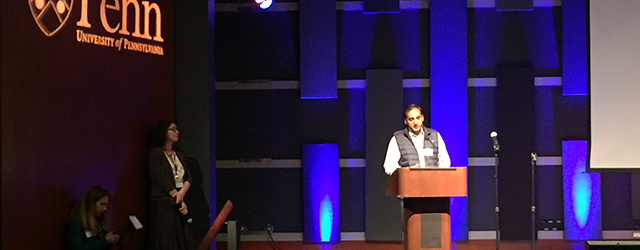Penn contest singles out two apps
Picking two winners to fund at Thursday’s Third AppitUP Demo Day sponsored by the Penn Center for Innovation wasn’t easy, said an apologetic judge Omar Mencin, a director of Ben Franklin Technology Partners.
Culled from a field of 313 submissions from 10 schools across the University of Pennsylvania, all six app finalists presenting before the venture capital community had good reasons to be up there, Mencin said. Each rocked the stage at World Cafe Live, vying for the $50,000 in start-up seed money that Ben Franklin T.P. would award to just two.
In the end, judges landed on two medically minded projects, Animotion and ProNoto, that clearly answered the question “Where’s the money?”
But an audience-voted appreciation award, giving free desk space at the soon-opening Pennovation Center, went to a nonmedical, lifestyle project, ParqAvenue, described by its developer as “the parking equivalent of Airbnb or Uber.”
And if Philadelphia’s city officials and social reformers had been judging, they’d likely have locked onto Reclamate, a proactive monitoring and reward strategy for keeping ex-cons on the straight and narrow.
For sure, there’s gold in the knee-joint-replacement market, now a $10 billion-a-year business between the early intervention, reconstruction, and home rehab. The AppitUP winner Animotion aims to profit from the $630 million post-op portion of the pie, explained presenters Feini Qu and Peter Gebhard, as it shrinks costs and improves recoveries of the walking wounded.
How so? Sensors on the knee, feeding data to a mobile phone app, will track patients’ home rehabilitation efforts, allow physicians and therapists to remotely study the patients’ mobility, and make recommendations. User-friendliness will be key, developers said, with progress scored in positive terms such as “Can you lift your grandchild?” Development partners Excellis and CloudMine are taking the vision to market.
The ProNoto app addresses medical professionals’ persistent need and obligation to keep up with the latest developments in their science, explained CHOP physician and app brainstormer Brian Jenssen. Peer-reviewed (rather than marketer-hyped) content culled from journals and institutional updates will be key to the information’s veracity and timeliness, he said, while the app’s tracking of users’ interaction will help them score continuing medical education credits, a requirement now costing each professional about $2,000 a year. Development partner Offshorent aims to make it, pronto.
Yes, there are already several apps that help steer drivers to vacant parking spots in busy cities, admitted Wharton grad Taylor Mills, developer (with Valex Consulting) of ParqAvenue.
Read the full article here.





